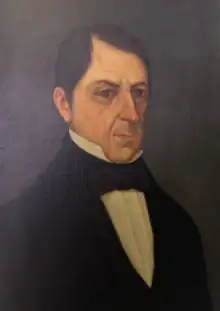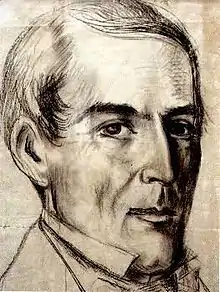Estanislao Vergara y Sanz de Santamaría
Estanislao Vergara y Sanz de Santamaría (March 8, 1790 – March 21, 1855) was a Colombian lawyer, politician, and statesman.[1] He served as the 3rd president of Colombia during the absence of Simón Bolívar from December 28, 1828, to January 15, 1830. He held various ministerial positions, including Minister of Foreign Affairs, Internal Affairs, Justice, and High Court.
Estanislao Vergara y Sanz de Santamaría | |
|---|---|
 | |
| 3rd President of Gran Colombia | |
| Minister | Foreign Affairs, Internal Affairs, Justice, High Court, State. |
| Governor | Governor of Cundinamarca |
| Preceded by | Simon Bolivar |
| Succeeded by | Simon Bolivar |
| President of Senate of Colombia Senator of Colombia Deputy for Bogotá | |
| Inspector General / Solicitor General Chancellor | |
| Personal details | |
| Born | March 8, 1790 Bogotá, Viceroyalty of New Granada |
| Died | March 21, 1855 Bogotá, New Granada |
| Political party | Colombian Conservative Party |
| Spouse | Teresa Tenorio Santacruz |
| Alma mater | Del Rosario University |
| Occupation | Lawyer, philosopher, professor, politician |
| Profession | Law, philosophy |
| Signature |  |
| Military service | |
| Allegiance | Mason Lodge "La Beneficencia" |
| Branch/service | Executive |
Vergara played a significant role in Colombian politics during a crucial transition and is known for his efforts to establish a monarchy in the country. He was instrumental in negotiating with European powers for the appointment of a French monarch in Colombia.
Early life
Vergara belonged to the Vergara family, which originated from Basque country, in the town of Bergara. The family's Colombian lineage began in 1612 with Francisco de Vergara y Azcarate, a Lieutenant Captain General of the Spanish Empire. His son, Antonio de Vergara Azcarate y Dávila, served as a royal treasurer for 50 years until his death, and his descendants continued to serve in the colonial bureaucracy, during the independence era, and into the republic. The Vergara’s formed alliances through marriage with other prominent families in Colombia, establishing themselves as one of the oldest and most aristocratic Spanish-American families in South America during the 17th, 18th, and 19th centuries.[2][3][4]
Career
During Bolívar's absence, Vergara served as a member of the State Ministry and led the executive branch. His role was crucial in advancing a project to establish a monarchy in Colombia. Empowered by the Council of Ministers, Vergara initiated contacts with Europe to explore the possibility of having a European monarch rule the country. He corresponded with Colombian ministers in Great Britain and France, specifically José Fernández Madrid and Leandro Palacios, expressing the council's preference for a French monarch. However, negotiations with Great Britain failed when the kingdom refused to approve a monarch of French origin for Colombia, despite Vergara's support.
Vergara's diplomatic activities, although initially secret, became public knowledge, leading to widespread opposition to the monarchical initiative. The opposition extended to Bolívar, who was aware of the council's efforts, but refrained from intervening. In an attempt to prevent intellectual Andrés Bello from leaving Colombia. Vergara proposed to Bolívar that he appoint Bello as Colombian ambassador to the United States. Bello rejected the offer as he had already been hired by the Chilean government for advisory work.

Later years
The most significant opposition to the diplomatic work of the Council government came from General José María Córdova. He led a movement defending the Constitution of Cúcuta and took up arms to reject Bolívar's invitation to join the Council of Ministers as Secretary of the Navy.
Upon Bolívar's return to Bogotá, Vergara resigned his position as secretary and was replaced by General Domingo Caycedo. Vergara then participated as a deputy for Bogotá in the Congress and signed the Constitution of April 1830. He subsequently served as the Minister of the Interior under General Santander's administration.
In recognition of his service and his frail health, the Colombian Congress approved a lifetime pension of forty pesos per month for Vergara on April 13, 1855. Vergara died later that year.
References
- "Estanislao Vergara Santamaría | Universidad del Rosario". urosario.edu.co (in Spanish). Retrieved May 15, 2023.
- Uribe, Victor M. (1995). "The Lawyers and New Granada's Late Colonial State". Journal of Latin American Studies. 27 (3): 517–549. doi:10.1017/S0022216X00011597. ISSN 0022-216X. JSTOR 158482. S2CID 145268140.
- Vergara y Vergara, J. C. (1951). Vida de Estanislao Vergara. Colombia: Iqueima.
- Vergara y Vergara, J. C. (1952). Don Antonio de Vergara Azcárate y sus descendientes: La colonia. La independencia. Spain: Impr. J. Pueyo.
.svg.png.webp)